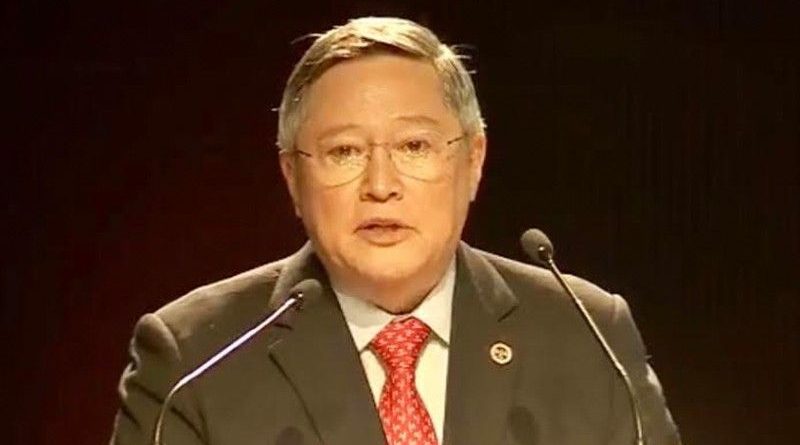MANILA – Economic managers: Political risks fail to dampen investors’ interest
MANILA, Philippines — Political chatter has failed to dampen the interest of the international business community in the Philippines based on record inflows of foreign direct investments (FDI), the country’s economic managers said yesterday.
In a statement, Finance Secretary Carlos Dominguez III said the country’s growth is on track despite concerns raised by Moody’s Investors Service that President Duterte’s contentious policies on law and order over the past two years as well as other political controversies could have a negative impact on the country’s attractiveness to financial and physical asset investors.
Data from the Bangko Sentral ng Pilipinas (BSP) showed the Philippines had booked record FDI inflows for two consecutive years at $10.05 billion last year from $8.28 billion in 2016.
This prompted the BSP to raise its FDI inflow target to $9.2 billion instead of $8.2 billion this year.
.
Dominguez said Moody’s has pointed out in its latest report that the first package of the comprehensive tax reform program under the Tax Reform for Acceleration and Inclusion (TRAIN) Law has already shown “pronounced impact on the government’s revenue performance” and has “complemented faster implementation of infrastructure development.”
“Moody’s itself has virtually recognized that with President Duterte’s enactment of the TRAIN Law, the government has managed to put in place a steady revenue source for its Build, Build, Build initiative, which will sustain the growth momentum and create a lot more jobs for Filipinos,” he added.
The Duterte administration has earmarked as much as P9 trillion to bankroll key infrastructure projects under the program as part of its massive infrastructure buildup until 2022.
“We duly recognize the benefits of maintaining a sound fiscal position as well as the adverse consequences of doing otherwise. Pursuing accelerated poverty reduction, widening of the middle class – while keeping the government’s finances healthy – is a strict policy of this administration,” Dominguez said.
The debt watcher said domestic political developments and potential governance changes pose downside risks on the country’s credit rating, maintained at Baa2 or a notch above minimum investment grade and stable outlook.
It added prospective changes in governance frameworks could have negative implications for public finances.
It cited a recent Supreme Court ruling that redefines the share of national government revenue to be transferred to local government units, as well as the proposed shift to a federal form of government.
“In each of these cases, the fiscal impact will in part be determined by the degree to which spending commitments will be devolved to the local levels of government. The shift to federalism would also likely incur an expansion in the aggregate size of the government and, hence, public expenditure,” it said.
For his part, BSP Governor Nestor Espenilla Jr. said monetary authorities remain committed to price stability.
“The BSP continues to maintain a close watch on domestic and external factors affecting prices. Elevated inflation this year is mainly due to supply-side pressures. However, inflation is expected to return to the target range of two to four percent by 2019,” he said.
The BSP vowed strong follow-through monetary adjustment during the rate-setting meeting of the central bank’s Monetary Board on Aug. 9 as inflation leapt to a fresh five-year high of 5.2 percent in June from 4.6 percent in May bringing the six-month average to 4.3 percent and exceeding BSP’s two to four percent target.
The BSP has raised benchmark rates by a total of 50 basis points through back-to-back 25 basis point rate hikes last May 10 and June 20 to curb rising inflationary pressures.
“The BSP is ready to take follow-through actions to the policy rate hikes done in May and June 2018 to further anchor inflation expectations and address any brewing demand-side pressures,” Espenilla said.
Lawrence Agcaoili (The Philippine Star) – July 22, 2018 – 12:00am
 All photographs, news, editorials, opinions, information, data, others have been taken from the Internet ..aseanews.net | [email protected] | For comments, Email to : Pahulu Gan – Contributor | [email protected]
All photographs, news, editorials, opinions, information, data, others have been taken from the Internet ..aseanews.net | [email protected] | For comments, Email to : Pahulu Gan – Contributor | [email protected]









